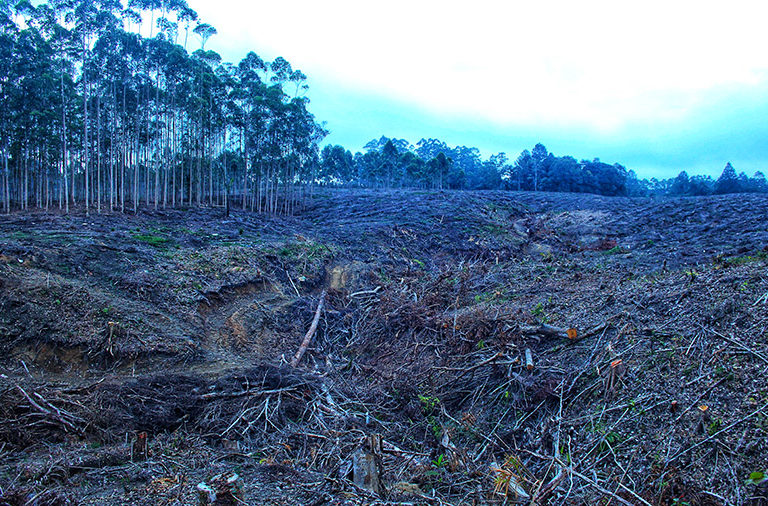- A recent clash between Indigenous community members in Sumatra and workers from pulpwood producer PT Toba Pulp Lestari has marred ongoing efforts to resolve a decades-long land conflict.
- The two sides have been locked in dispute over the land in North Tapanuli district since 1992, with 23 Indigenous communities claiming ancestral rights to some 20,754 hectares (51,284 acres) inside the concession granted to TPL, an affiliate of pulp and paper giant Royal Golden Eagle.
- In the wake of the recent clash, Indonesia’s national parliament has called on the police to investigate and press charges against the company for the violence against the communities.
- While a resolution is still far from being achieved, many members of the Indigenous communities defending their land claims against TPL have been met with violence and imprisonment.
MEDAN, Indonesia — A recent clash between Indigenous community members in Sumatra and workers from a pulpwood plantation company has marred ongoing efforts to resolve a decades-long land conflict.
At least a dozen members of the Natumingka Indigenous community in North Sumatra province were reported to have been injured during a clash that broke out on May 18 when they blocked some 400 workers and security guards of PT Toba Pulp Lestari (TPL) from entering the disputed area. They had staged the protest to defend what they say is their ancestral land. Police officers were present at the scene at the request of the company.
Among those injured was Jusman Simanjuntak, 75, who had to receive multiple stitches after being struck in the head when the clash turned violent and rocks were being thrown.
“The defeat of Natumingka on May 18, 2021, is not a regret for me, but that became a moment of resurgence of the Natumingka community,” he said at an online press conference on June 3.
The two sides have been locked in dispute over the land in North Sumatra’s North Tapanuli district since 1992. Twenty-three Indigenous communities, including the Natumingka, claim ancestral rights to some 20,754 hectares (51,284 acres) inside the concession granted to TPL, an affiliate of pulp and paper giant Royal Golden Eagle.
The company, previously known as PT Inti Indorayon Utama, was initially granted a 269,060-hectare (664,862-acre) concession, but this was reduced in 2020 to 167,912 hectares (414,920 acres) by the environment ministry as it overlapped with Indigenous lands. The Indigenous communities contend much of the concession is part of their ancestral territory, but TPL has already planted half of the disputed area with eucalyptus.
In August 2019, the environment ministry ordered TPL to halt its activities pending a resolution between all sides.
At the same time, the Indigenous communities have been working to receive state recognition for Indigenous land certification. Since 2013, when a landmark Constitutional Court ruling struck down the state’s claim to Indigenous peoples’ forests, the government has recognized the rights of dozens of Indigenous groups to forest areas across Indonesia.
But the communities in North Tapanuli say the Indigenous land recognition process for them is taking much longer than needed. Jusman said that some 300 million rupiah ($20,800) that was allocated to fund the process has been requisitioned for efforts to curb the spread of COVID-19.
“The communities were ready to help funding if that’s what it takes, but the government declined saying that it has no legal basis,” Jusman said.



In the wake of the recent clash between the Indigenous communities and TPL, Indonesia’s national parliament has called for the police to investigate and press charges against the company for the violence against the communities.
“The fact is that the land concession is overlapping with Indigenous lands, creating a rooted agrarian conflict that has been going on for so long and unresolved up to this day,” Bambang Soesatyo, the parliamentary speaker, said in a statement.
Jandres Silalahi, an executive at TPL, said the company regretted the clash that broke out at a time when dialogue between all stakeholders was ongoing to try and resolve the conflict.
While a resolution is still far from being achieved, many members of the Indigenous communities defending their claims against TPL have been met with violence and imprisonment. In 2000, a university student and a high school student were killed defending the area against TPL.
The Indigenous communities have since the early 1900s claimed ancestral rights to a large swath of forest in what is today North Tapanuli district, where they still practice subsistence farming today. In 1913, the communities loaned part of the land to the Dutch colonial authorities for a pine plantation. After Indonesia declared independence from the Dutch in 1945, the new government claimed the pine forest, among other Dutch-run assets and properties at the time, as belonging to the Indonesian state.
“If the district leader doesn’t care about the Natumingka community, we will keep on fighting,” Jusman said.

Banner image: Indigenous communities and workers of PT Toba Pulp Lestari broke clashed on May 18 in Sumatra’s North Tapanuli district, by Ayat S. Karokaro/Mongabay Indonesia
This story was first reported by Mongabay’s Indonesia team and published here on our Indonesian site on May 21, 2021.
FEEDBACK: Use this form to send a message to the author of this post. If you want to post a public comment, you can do that at the bottom of the page.














